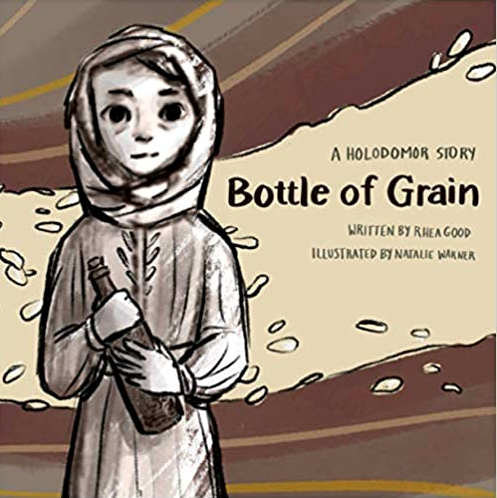A new book by a local author is hoping to spread awareness of the Holodomor to elementary school children.
The book is called Bottle of Grain, written by Rhea Good of Battleford and illustrated by Natalie Warner. The book is available in time for Holodomor commemoration week from Nov. 23-27 and the National Day of Holodomor Commemoration on Nov. 28.
Holomodor was the 1932-33 famine in Soviet Union-era Ukraine that is recognized as a genocide upon the Ukrainian people.
Good has been involved with the Saskatchewan Holodomor Awareness and Education Committee and she says their mandate was to develop resources for schools so kids would become aware of what the Holodomor was.
It was suggested that “what we need is one book, one read-aloud book,” said Good. She cited as an example that “In Flander’s Fields” is that primary text used to introduce Remembrance Day to students in school, and they were looking for something similar regarding Holomodor.
“I just felt like our Holodomor awareness campaign would benefit from that book, that central book, that would be a children’s book, accessible, written for children for that audience,” said Good, and make that complex issue understandable.
In her readings, Good came across an anecdote about Maria Soroka, a Holodomor survivor, and a story about a bottle of grain was found in Ukraine in 2012. It turned out the elderly villagers remembered the Soroka family had hidden bottles of grain before the soldiers came to the village.
“For whatever reason that just stuck in the mind, I thought it was a very compelling anecdote,” said Good.
In March, Good had been doing a teaching contract and it was at that time that the schools were shut down due to COVID-19. At that point it all fell into place and she decided, “I’m writing it.” She found an illustrator, Natalie Warner, and they were able to get it published before November.
The story is seen through the eyes of Maria Soroka while she was a young girl at seven years old.
“I’m trying to take the complexity of the situation and explain that through the eyes of the central character,” Good said.
She said a good comparison would be to the Diary of Anne Frank which explains the complexity of World War II.
According to the description at , “During the winter of 1932-1933 Maria was a young girl who experienced great hardships after soldiers seized all the food from her family and the entire village. The complex political background of the Holodomor is personalized in this story of the Soroka family’s struggle to survive with nothing to eat. In December 2012, a large bottle full of grain was accidentally found under a tree near the Village of Velyki, near the City of Vinnytsia, Vinnytsia Province, Ukraine. Elderly villagers remembered the Soroka family had been hiding bottles of grain before the winter of the Holodomor. The bottle of grain is the tangible artifact around which this story is built.”
The book is designed to be a very readable book, and has an ending that inspires hope.
“When we look at atrocities against humanity through children’s eyes, I hope that that will bring a different level of understanding to the adults who are also exposed to the story.”
The book is available online at and author-signed copies can be obtained at Battleford Furniture in Battleford and the Cupcake Cafe in North Battleford. Some more outlets will be added in the months to come.




